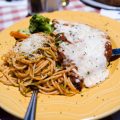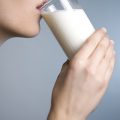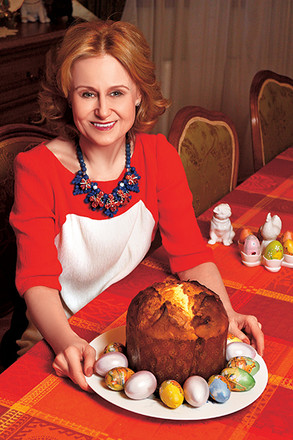
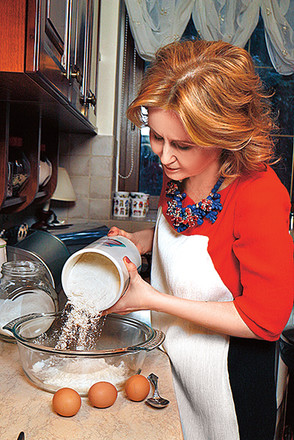
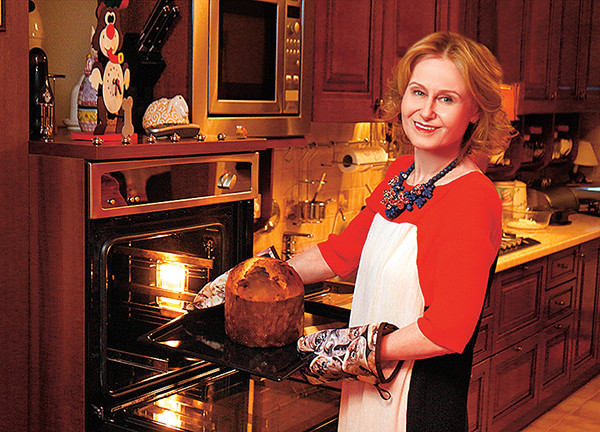 1/3Photo: Sergey Dzhevakhashvili/AntennaPhoto:Sergey Dzhevakhashvili/AntennaPhoto: Sergey Dzhevakhashvili/AntennaDaria Dontsova, writer: – My husband is a believer, I am not. But if you do not believe, this does not mean that God will not help you. On Easter, I always bake Easter cakes, make paskha. With my granddaughters, we paint eggs with onion skins. When I get a lot of eggs, even if they were not blessed in church, I do not throw them away, but give them to the birds. This is such a Christian tradition. I learned to bake Easter cakes from my grandmother. At that time, we lived in a communal apartment. At 12 o'clock at night on Maundy Thursday, my grandmother would stand at the stove (she was a believer and could not bake on Great Wednesday of the Passion of Christ). Grandma had four old long forms with clasps on the side. The dough was made in buckets. Then grandma and her neighbors would go to the bakery on Myasnitskaya (Kirov Street in my childhood). They would make arrangements with the workers to bake Easter cakes in huge ovens at night, since the molds would not fit into the gas stove. More than 30 Easter cakes would be baked. Then they would take down pillows, put the molds on them, open the latches, roll the Easter cakes out into these pillows and “rest” there until they became cold. When we moved to a new apartment in the 60s, the molds disappeared, and we began to bake Easter cakes in jars from instant coffee and canned goods. Then the country was flooded with trade abundance, and disposable paper molds appeared. But they never produce such delicious Easter cakes as grandma had. Recipe from Daria Dontsova Melt 250 g of butter over low heat. Mix 5 eggs with 10 tsp. sugar, add 2 cups of flour, mix. Heat 0.5 l of milk so that it is slightly warm, and dilute the dough with it. Dilute 0.5 sticks of pressed (not dry!) yeast, a little sugar in 2-3 tbsp. warm milk. When the yeast foams, pour it into the dough. Mix and add flour to get a not very tough dough, the same consistency as for eclairs. Add some raisins, candied fruits and, if you like, dried fruits. But keep in mind: the more dried fruits you put in, the less the dough will rise. Then let the dough rise and knead it, then again: let it rise and knead it. Grease the mold with butter and fill it 2/3 full with dough. Grease the top of the dough with yolk. Place in the oven, preheated to exactly 180 0 C, and bake until the dough rises. Soak a waffle towel in ice water, squeeze it out, and spread it out. Place the pan with the kulich on the towel and quickly cover the kulich with the edges of the towel. Count to 20 and remove the towel. This way, the kulich will not have a hard crust. Secrets of a delicious kulich from Daria Dontsova 1. Buy good products, for example, real butter, not substitutes. 2. Cook in a good mood! If you are arguing with someone, or the TV or radio is on in your kitchen, the kulich will not work. 3. Stir the dough and other ingredients only in one direction, clockwise. This is how oxygen enters the dough. Stir everything yourself, not with a mixer.
1/3Photo: Sergey Dzhevakhashvili/AntennaPhoto:Sergey Dzhevakhashvili/AntennaPhoto: Sergey Dzhevakhashvili/AntennaDaria Dontsova, writer: – My husband is a believer, I am not. But if you do not believe, this does not mean that God will not help you. On Easter, I always bake Easter cakes, make paskha. With my granddaughters, we paint eggs with onion skins. When I get a lot of eggs, even if they were not blessed in church, I do not throw them away, but give them to the birds. This is such a Christian tradition. I learned to bake Easter cakes from my grandmother. At that time, we lived in a communal apartment. At 12 o'clock at night on Maundy Thursday, my grandmother would stand at the stove (she was a believer and could not bake on Great Wednesday of the Passion of Christ). Grandma had four old long forms with clasps on the side. The dough was made in buckets. Then grandma and her neighbors would go to the bakery on Myasnitskaya (Kirov Street in my childhood). They would make arrangements with the workers to bake Easter cakes in huge ovens at night, since the molds would not fit into the gas stove. More than 30 Easter cakes would be baked. Then they would take down pillows, put the molds on them, open the latches, roll the Easter cakes out into these pillows and “rest” there until they became cold. When we moved to a new apartment in the 60s, the molds disappeared, and we began to bake Easter cakes in jars from instant coffee and canned goods. Then the country was flooded with trade abundance, and disposable paper molds appeared. But they never produce such delicious Easter cakes as grandma had. Recipe from Daria Dontsova Melt 250 g of butter over low heat. Mix 5 eggs with 10 tsp. sugar, add 2 cups of flour, mix. Heat 0.5 l of milk so that it is slightly warm, and dilute the dough with it. Dilute 0.5 sticks of pressed (not dry!) yeast, a little sugar in 2-3 tbsp. warm milk. When the yeast foams, pour it into the dough. Mix and add flour to get a not very tough dough, the same consistency as for eclairs. Add some raisins, candied fruits and, if you like, dried fruits. But keep in mind: the more dried fruits you put in, the less the dough will rise. Then let the dough rise and knead it, then again: let it rise and knead it. Grease the mold with butter and fill it 2/3 full with dough. Grease the top of the dough with yolk. Place in the oven, preheated to exactly 180 0 C, and bake until the dough rises. Soak a waffle towel in ice water, squeeze it out, and spread it out. Place the pan with the kulich on the towel and quickly cover the kulich with the edges of the towel. Count to 20 and remove the towel. This way, the kulich will not have a hard crust. Secrets of a delicious kulich from Daria Dontsova 1. Buy good products, for example, real butter, not substitutes. 2. Cook in a good mood! If you are arguing with someone, or the TV or radio is on in your kitchen, the kulich will not work. 3. Stir the dough and other ingredients only in one direction, clockwise. This is how oxygen enters the dough. Stir everything yourself, not with a mixer.

Making Money with Desserts: Success Stories
Evgeniya Polischuk (Fedutinova) instagram:@evgeniyafedutinovavk.com/janeshomebaking– It all started with baking for family and friends. Gradually, I started posting photos of my baked goods on Instagram – and orders started coming in. I made my first custom-made cake on October 13, 2014, and a little earlier I started making macaroons and cupcakes. You could say that the business “found me”, I am very […]

Soups are cold recipes with photos
Cold cucumber soup with yogurt and lemonsorbet from the chef of the restaurant La Taverna Alexander Zhurkin Photo: Getty Images Ingredients: Plain yoghurt – 125 g Cucumber – 150 g Lemon/lime sorbet – 50 g Cocktail shrimp – 24 g Fresh ginger juice – 1 g Lime juice – 5 g Fresh orange juice – 5 g Parsley – 1 g Pink pepper – 1 g Watercress – […]

barbeque kebab
Pork tenderloin in glaze Photo:Dmitry Bayrak/dbstudioPreparation time: 20 minutes + marinating time.Calories: 454 kcal per serving.For 4 servings: 4 pork tenderloins (approximately 300 g each), 1 onion, 2 cloves of garlic, 1 tsp. lemon zest, 1 tsp. lemon juice, a pinch of ground cumin, coriander and turmeric, 1 tbsp. vegetable […]

Pierre Duacan: dietary recipes: Ducane diet
Beetroot soup Photo:Season’S, Luxury Hotels RepresentationYou will need:· Boiled beetroot – 60 g· Fresh cucumbers – 20 g· Red radish – 20 g· Green onions – 10 g· Egg – 1 pc.· Drinking mineral water – 200 g· Salt – 1 gPreparation:· Boil the egg and beetroot.· Grate the cucumbers, radish and part of the beetroot. Put everything […]
